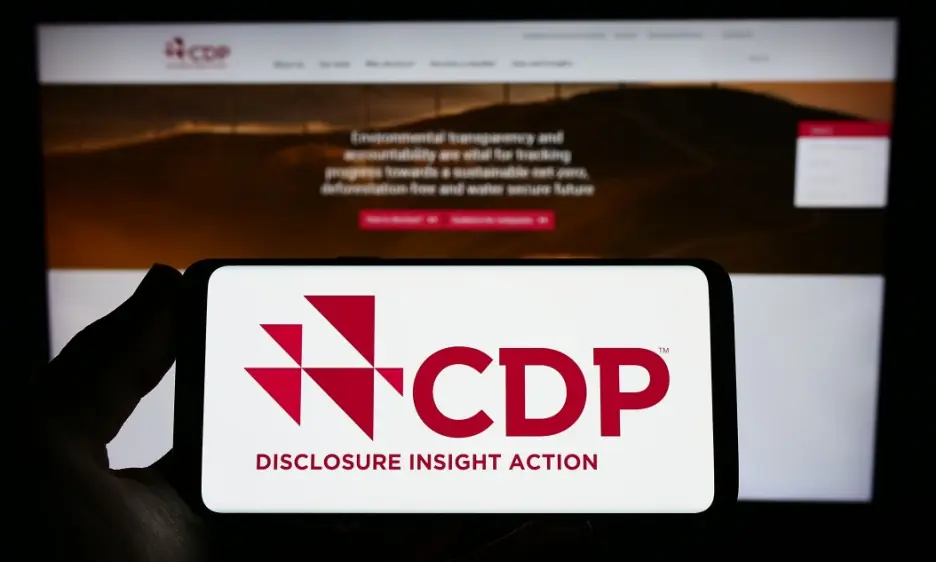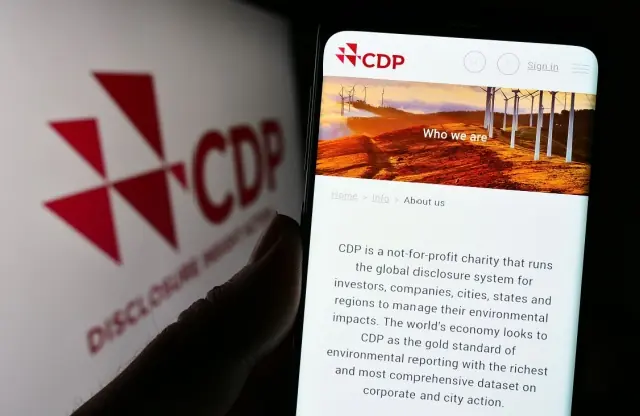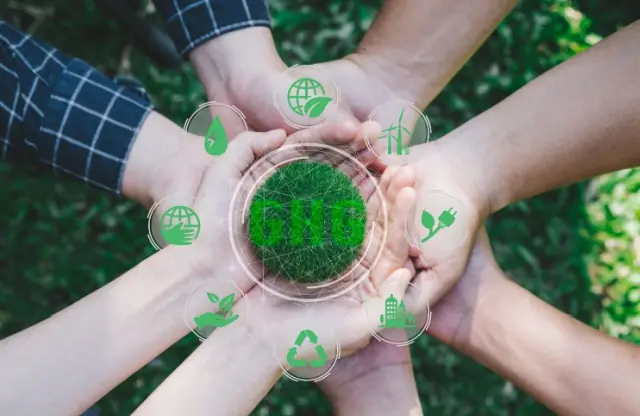Understanding What Makes the Carbon Disclosure Project (CDP) Important
 Share
Share
 Copy Url
Copy Url

The Carbon Disclosure Project (CDP) helps businesses take control of their sustainability journey. It focuses on tracking and improving key areas like carbon footprint, greenhouse gas emissions, and supply chain impacts. By following the CDP framework, companies can enhance their environmental reporting, make impactful ESG disclosures, and lead in sustainability reporting. The CDP also provides a clear path to manage risks and identify opportunities to boost ESG performance.
Participating in the CDP helps businesses build trust, reduce emissions, and gain insights into the supply chain. Its scoring system ensures transparency, offering measurable benchmarks for progress. This article explains what the Carbon Disclosure Project (CDP) is and highlights the benefits of participating in the CDP for businesses. It also covers how the CDP scoring system works, steps to prepare for CDP reporting and ways to leverage CDP data for business growth.
If you’re looking to position your company as a sustainability leader, the CDP can provide the tools and recognition you need to stay ahead. Read on to discover how!

What is the Carbon Disclosure Project (CDP)?
The Carbon Disclosure Project (CDP) is a global non-profit organization that helps companies, cities, states, and regions measure, manage, and reduce their environmental impact. It offers a trusted platform for disclosing environmental information, ensuring transparency and accountability.
CDP’s reporting framework enables organizations to track key metrics like carbon emissions, water usage, and supply chain environmental footprints. These insights help identify areas for improvement, set sustainability goals, and create actionable strategies.
Participation in CDP goes beyond regulatory compliance. It builds stakeholder trust, improves ESG disclosures, and aligns operations with global standards such as the GHG Protocol. The framework also supports accurate reporting of Scope 1, 2, and 3 emissions, covering direct and indirect emissions.
CDP promotes responsible practices and improves environmental reporting to help organizations combat climate change and environmental degradation. It provides a clear path to leadership in tackling the world’s sustainability challenges.
History and Global Significance
The Carbon Disclosure Project (CDP) was established in 2000 to encourage companies to disclose their climate impact and take meaningful action to address it. Initially focused on tracking carbon emissions and energy use, it soon evolved into a global environmental initiative. Recognizing the interconnected nature of environmental issues, CDP expanded its focus to include deforestation and water security. This broader approach strengthened its role as a leader in sustainability reporting.
Today, CDP operates in over 90 countries and is a trusted platform for environmental data. It collaborates with investors, businesses, and policymakers to advance ESG reporting frameworks such as the Task Force on Climate-Related Financial Disclosures (TCFD). In 2022, nearly 18,700 organizations disclosed their environmental information through CDP, reflecting its growing global relevance. By linking environmental performance with economic value, CDP has become a vital tool for organizations aiming to meet sustainability goals and address urgent climate challenges.
Focus Areas
- Climate Change: CDP helps organizations measure and manage greenhouse gas emissions, including Scope 1, 2, and 3, to reduce climate-related risks.
- Water Security: It promotes sustainable water use and management to tackle global water challenges.
- Deforestation: CDP encourages responsible sourcing and land use to prevent deforestation and reduce its environmental impact.
- Plastics: It addresses plastic pollution by urging companies to disclose and reduce plastic use and waste.
- Biodiversity: CDP supports protecting and restoring biodiversity through responsible environmental practices.
Importance for Stakeholders
- Investors: CDP provides standardized environmental data. This data helps investors assess risks and opportunities while aligning with ESG reporting frameworks like TCFD.
- Businesses: Participation improves transparency, enhances environmental performance, and aligns with global standards like the GHG Protocol.
- Policymakers: Reliable data supports informed decisions and helps create regulations to lower environmental impact.
- Consumers: Greater transparency enables consumers to make better-informed choices based on a company’s environmental practices.
- Supply Chain Partners: CDP promotes responsible practices across the supply chain, reducing indirect emissions and encouraging sustainability.
CDP plays a vital role in addressing global environmental challenges by fostering accountability and transparency.

Benefits of Participating in the CDP for Businesses
Engaging with the Carbon Disclosure Project (CDP) provides significant benefits for businesses:
Enhancing Transparency and Credibility
Disclosing environmental information through CDP’s global disclosure system demonstrates operational transparency. This builds trust with stakeholders, including investors, customers, and regulators, while boosting the company’s credibility.
Identifying Climate-Related Risks and Opportunities
CDP enables businesses to assess their environmental impact, especially concerning greenhouse gas emissions. This helps identify climate-related risks and opportunities, allowing companies to create strategies to manage risks and seize opportunities.
Aligning with Global Sustainability Standards and Investor Expectations
Participating in CDP helps businesses meet global sustainability standards and investor demands. Reporting on direct and indirect emissions demonstrates a commitment to a sustainable economy, attracting environmentally focused investors.
Gaining a Competitive Edge through Environmental Leadership
Proactively managing environmental impact through CDP showcases leadership. Consumers and partners find companies with strong environmental practices more favorable, boosting market share and brand loyalty.
Supporting Compliance with Regulatory Requirements
CDP participation ensures businesses stay ahead of environmental regulations. Systematically tracking and reporting data helps ensure compliance, reducing the risk of penalties.
The Carbon Disclosure Project (CDP) helps businesses enhance transparency, manage risks, align with standards, gain a competitive edge, and meet regulatory demands.

How the Carbon Disclosure Project (CDP) Scoring System Works
The Carbon Disclosure Project (CDP) evaluates organizations' environmental performance through a structured scoring system. This system assesses responses to the CDP questionnaire, focusing on various criteria to gauge environmental impact and management.
CDP Questionnaire and Evaluation Criteria
The CDP questionnaire is a comprehensive tool that collects data on an organization's environmental practices. It covers areas such as climate change, water security, and deforestation. The questionnaire evaluates:
- Governance: How companies manage environmental issues at the leadership level.
- Risk Management: Identification and mitigation of environmental risks.
- Targets and Performance: Setting and achieving environmental goals.
- Emissions Data: Reporting on greenhouse gas emissions, including Scope 1, 2, and 3.
These criteria align with global standards like the Global Reporting Initiative (GRI), ensuring consistency in environmental disclosures.
Scoring Levels: Disclosure, Awareness, Management, and Leadership
CDP's scoring system categorizes performance into four levels:
- Disclosure: Assess the completeness of the information provided.
- Awareness: Evaluate understanding of environmental issues and their impacts.
- Management: Look at implementing policies and actions to address environmental concerns.
- Leadership: Recognizes best practices and strategies that lead to environmental stewardship.
Progressing through these levels reflects an organization's commitment to improving its environmental impact.
Improving Scores Through Enhanced Environmental Practices
To increase your score in the Carbon Disclosure Project (CDP), focus on:
- Enhancing Data Accuracy: Ensure precise and comprehensive reporting of environmental data.
- Implementing Robust Policies: Develop and enforce environmental policies that address key issues.
- Setting and Achieving Targets: Establish measurable environmental goals and track progress.
- Engaging Stakeholders: Involve stakeholders, including cities and governments, in environmental initiatives.
Continuous improvement in these areas demonstrates a commitment to corporate social responsibility.
Value of a High CDP Score for Stakeholders
A high Carbon Disclosure Project (CDP) score signals strong environmental performance, which is valuable to stakeholders:
- Investors: View high scores as indicators of sustainable practices and reduced risks.
- Customers: Prefer companies with strong environmental credentials.
- Regulators: Recognize and may favor organizations with transparent environmental reporting.
Achieving a high CDP score significantly boosts a company’s reputation. This showcases its commitment to sustainability and strong environmental practices. It shows leadership in transparency and accountability, which appeals to investors, customers, and regulators. A high score can also provide a competitive edge by building trust, attracting environmentally conscious stakeholders, and setting the company apart.

Preparing for CDP Reporting: Key Steps for Success
Preparing to report to the Carbon Disclosure Project (CDP) requires a structured approach to meet its reporting requirements. By collecting data, aligning with recognized frameworks, engaging stakeholders, and streamlining processes, businesses can improve their sustainability reports and prove commitment to sustainable business practices.
Importance of Data Collection and Management
Accurate data collection is crucial for CDP reporting. Gather comprehensive information on emissions, water usage, and deforestation metrics. This includes tracking Scope 3 emissions, which cover indirect emissions from the supply chain. Effective data management ensures that your sustainability reports reflect true environmental impact.
Aligning with Recognized Frameworks
Align your reporting with established frameworks like the GHG Protocol and Task Force on Climate-related Financial Disclosures (TCFD). These methodologies provide standardized approaches to measuring and disclosing environmental data, ensuring consistency and credibility in your ESG reporting.
Engaging Internal and External Stakeholders
Involve internal teams and external partners to gather data accurately. Collaborate with operations, finance, procurement, suppliers, and customers. This collective effort ensures a comprehensive understanding of your environmental impact.
Engaging a Sustainability Consultant or Specialist
Consider hiring a sustainability consultant or specialist to navigate the complexities of CDP reporting. Experts like Report Yak, a leading report design agency for sustainability reports, can provide valuable insights and help prepare thorough and compelling reports.
Tips for Streamlining the Reporting Process
- Start Early: Begin the reporting process well in advance to accommodate data collection and review.
- Assign Clear Roles: Define responsibilities within your team to ensure accountability and efficiency.
- Use Reporting Software: Leverage specialized software to manage data and streamline reporting tasks.
- Conduct Regular Reviews: Periodically assess data accuracy and completeness to avoid last-minute issues.
- Stay Updated on CDP Guidelines: Regularly review CDP's latest guidelines to ensure compliance with current reporting requirements.
- Train Your Team: Provide training on CDP works and reporting methodologies to enhance team competence.
- Engage with Peers: Network with other businesses to share best practices and insights on CDP reporting.
- Document Processes: Maintain clear documentation of data sources and methodologies for transparency.
- Set Internal Deadlines: Establish internal milestones to track progress and stay on schedule.
- Seek Feedback: After submission, review feedback from CDP to identify areas for improvement in future reports.
By following these steps, businesses can prepare for CDP reporting, showing their commitment to sustainability thus enhancing their environmental disclosures.

Leveraging CDP Data for Business Growth
Leveraging insights from the Carbon Disclosure Project (CDP) can greatly boost business growth. CDP data helps companies make smarter decisions, improve operations, enhance marketing, innovate products, and build resilience for the future.
Informing Strategic Decision-Making and Risk Management
CDP data offers a clear view of a company’s environmental impact, identifying risks and opportunities. Analyzing this data helps businesses create strategies to address risks and benefit from sustainable opportunities. This supports informed decisions and aligns with sustainable business practices.
Optimizing Operations and Reducing Costs
The CDP disclosure process highlights inefficiencies in energy, water use, and resources. Fixing these inefficiencies cuts costs and improves efficiency. For example, reducing energy consumption lowers utility bills and a company’s carbon footprint.
Enhancing Marketing of Sustainability Initiatives
CDP data in sustainability reports and ESG reporting shows a company’s environmental responsibility. Transparency attracts sustainability-focused clients and investors, boosting reputation and opening business opportunities.
Driving Innovation to Meet Customer Demand
Insights from CDP submissions reveal consumer interest in sustainable products. Businesses can use this data to innovate and offer solutions that meet demand. This drives competitive advantage and aligns products with environmental goals.
Enhancing Long-Term Resilience and Profitability
Integrating CDP insights strengthens resilience against environmental risks and regulatory changes. This approach supports compliance and ensures long-term profitability. High data quality in CDP reporting reflects a company’s commitment to sustainable growth.

Sustainability Reporting Excellence with Report Yak
The Carbon Disclosure Project (CDP) is a vital tool for businesses committed to sustainability. CDP helps organizations track metrics like greenhouse gas emissions, water usage, and supply chain impacts. This provides a clear path to transparency and accountability. Participation enables businesses to align with global standards, reduce inefficiencies, identify risks, and seize opportunities. Additionally, leveraging CDP insights supports informed decision-making, long-term resilience, and growth.
For impactful reporting, a high-quality sustainability report design is crucial. At Report Yak, we craft award-winning sustainability reports tailored to meet your needs. Our expertise ensures your CDP submissions are clear, compelling, and aligned with global standards. View our LACP award-winning reports in the Sustainability and ESG categories, on our Showcase page.
To book a consultation or speak with our team, call us at 1800 121 5955 (India) or email contact@reportyak.com. You can also WhatsApp us your contact details for a prompt response or fill out the Contact Form on our website with your project details.
Related Posts
-
How To Adopt BRSR Guidelines For Success
Oct 15, 2025Share
Copy Url
Simplifying ESG Disclosure for Better Impact
corporate reportingenvironmental and social initiatives
+6
Aug 28, 2025Share
Copy Url
GRI Sustainability Taxonomy: Learn How to Turn Data Into Advantage
corporate governancecorporate reporting
+11
Jul 1, 2025Share
Copy Url


